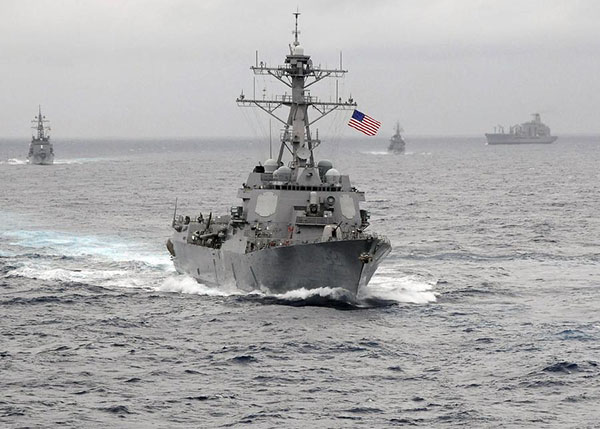US should respect China's sovereignty, core interests
Updated: 2015-11-04 07:34
(China Daily)
|
|||||||||||
 |
|
The US Navy guided-missile destroyer USS Lassen sails in the Pacific Ocean in a November 2009 photo provided by the US Navy. [Photo/Agencies] |
Not surprisingly, the "freedom of navigation" operations conducted by the United States in the South China Sea featured in the meetings between high-ranking Chinese military officers and Admiral Harry Harris, commander of the US Pacific Command, in Beijing on Tuesday.
Defense Minister Chang Wanquan told Harris that the US move could easily lead to misunderstandings and misjudgments, and bring new uncertainties to regional security, while Chief of General Staff of the People' Liberation Army Fang Fenghui reiterated China remains resolute in its determination to safeguard its sovereignty and maritime interests.
Such face-to-face talks between high-ranking army officers from both sides should help both militaries better understand each other's strategic intentions and avoid any miscalculation.
Tensions between China and the United States have flared up after the US destroyer USS Lassen entered the waters near Zhubi Reef in Nansha Islands last week without the permission of the Chinese government.
China deems the US move a provocation that undermines its sovereignty and security interests, while the US insists it was meant to assert the right of free passage.
In a clear signal that the US is not paying due attention to China's rightful concerns, US Deputy National Security Adviser Ben Rhodes said on Monday that there would be more such operations. Under such circumstances, without proper risk management the current feud over the US' provocative move will only escalate and could even lead to confrontation.
Admittedly, thanks to efforts from both sides, China-US military-to-military ties on the whole have been improving. As Harris told his Chinese hosts, there will be 33 interactions between the two militaries over the next two weeks.
But it is also true that whenever the US chooses to have its own way or show no regard to China's legitimate security concerns or core interests, disputes arise.
In a speech delivered at Peking University on Tuesday, Harris insisted the US routine operations "should never be construed as a threat to any nation". If that is the case how can the US view China's resolve to safeguard its territorial sovereignty and maritime interests as a threat? Any unilateral move of provocation will only throttle mutual efforts to better manage differences and fend off risks.
Related Stories
South China Sea territories must be secured 2015-11-03 13:21
Foreign ministry dismisses tribunal ruling on South China Sea case 2015-10-30 18:43
Historical evidence of China's sovereignty over the South China Sea 2015-10-30 16:44
Navy brass confer on South China Sea dispute 2015-10-30 11:25
Today's Top News
China, France made progress in nuclear energy cooperation
More than 100 UK investment projects revealed
Hollande highlights green growth during visit
Tougher controls leave migrants stuck in Austria
China and France sign 17 cooperative agreements
Technical fault, pilot error ruled out in Egypt jet crash
Russian jet broke up in mid air
GDP growth targeted at 6.5 to 7% through 2020
Hot Topics
Lunar probe , China growth forecasts, Emission rules get tougher, China seen through 'colored lens', International board,
Editor's Picks

|

|

|

|

|

|






